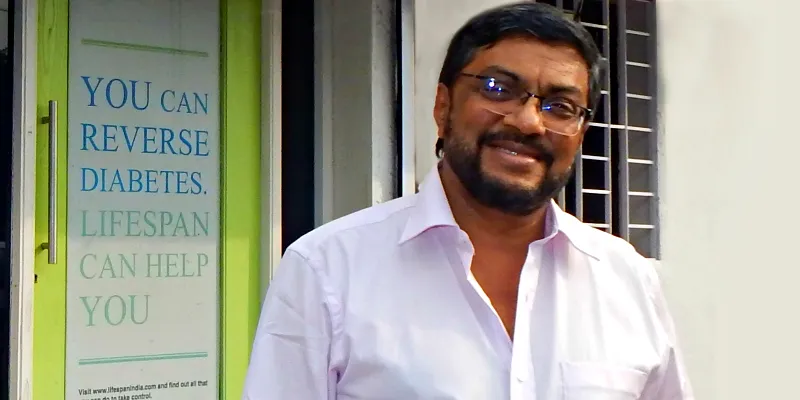Former Cadbury CEO and diabetic Ashok Jain turned his personal nightmare into a meaningful business
In retrospect, Ashok Jain’s life is a collection of really simple decisions that led to equally uncomplicated and infallible results. When he had to choose a course to pursue, he deduced that he was bad at drawing and chose engineering. When the time came to decide amongst the three equally renowned colleges — IISC, IIT (Mumbai) and NITIE (Mumbai)— that he had cracked for a master’s degree, he chose the latter, for it had independent rooms with an attached bathroom – yet another simple decision.
When five companies invited him on board during his college placements, he placed his faith on the earnest MNC offering the lowest package, which culminated in a stupendously fruitful two-decade stint at Cadbury Schweppes. And as the time came when the company moved some things around internally and the job seemed to have run its course, he did the math, evaluated the skills he had amassed over two decades, took the plunge and surely enough, he learnt to fly.

Sweet disposition
Born in 1957 in Hyderabad, Ashok Jain studied chemical engineering from Osmania and did his Masters in Industrial Engineering from NITIE, Mumbai.
He joined Cadbury in 1998, when it was still run by Schweppes, and set sails for the city of dreams – a place that he would come to call home. “I worked in every department - industrial engineering, production planning, and quality control; headed IT, strategy, the ice-cream business, and served as Vice President of Exports, before serving as CEO of their soft drinks business. It was a exciting twenty years,” he says, jokingly adding, “I made everyone diabetic, so I’ve got to help them now!”
During his term, the worldwide Schweppes business got taken over by The Coca-Cola Company. “A part of the team had to go to Coca-Cola as a part of the ‘sale.’ And let’s just say, I could not get along with the colour red, after bright yellow of Schweppes,” he jokes, cryptically.
All his mentors and well-wishers convinced him that he was business-ready. “My childhood habit kicked in. In 2000, I started a dotcom company, and it went bust like all dotcoms,” he recalls, of a short chapter before the long haul.
The long night
The long haul refers not only to his upcoming success as an entrepreneur, but also the decade-long tussle he had been having with diabetes. “My health graph had been erratic since 1994. On a cold evening in December 2002, I was recommended insulin, with no Internet tutorials, reference points or explanations by doctors on how to use it. It was unnerving. Well-known doctors have long queues and less time per patient – which is not so great for people with lifestyle disorders. An already stressed patient spends time waiting and going place to place for each service. Education on diabetes was low and myths galore, back then. All this was an opportunity to do good,” Ashok says.
His personal nightmare metamorphosized into Oxygen Healthcare – a pharma strategy and advertising company, Oxygen TV – a venture dispensing health education via television in 6,500 doctors’ waiting rooms in 20 cities, and Lifespan – a chain of specialised clinics for treating diabetes.
“I dreamt of a chain that is built on education and care. But the greatest challenge was in starting! New business area, no medical experience was a handicap,” he recalls, of his apprehensions. He was once on the advisory board of Times of India and had links with them. They came on as a partner with investment in form of advertising. “We designed a chain of clinics connected by cloud, available 24x7, with a specialist team in each clinic including diabetologists, dieticians and diabetes educators,”he says.
Risk to R.I.S.C.
When the R.I.S.C. test—a unique, non-invasive and completely painless test checking 30 cardiometabolic and other vital health parameters in under seven minutes and helps one detect one's risk for Diabetes related complications—was invented, Lifespan became and remains to be the only clinic to offer the service. Other diagnostic equipment on HBA1C, retina, foot were also added to the kitty. “We focused on pre-diabetes, and brought on various products like glucometers, low GI rice, methi fibre etc., under one roof. We also have value-based annual plans and four-month plans as diabetes is a lifelong partner. Education, care and management are the ABCs of not just treating but supporting diabetes patients.”
Of the milestones so far, Ashok quips, “Going from Mumbai to Delhi to Bengaluru to seven more cities has been a great journey. November of 2014 was our best month so far - we opened six clinics!”
Diabetic for a cause
A tenth of India's population are diabetic and 20 percent are pre-diabetic. Since Ashok's ventures hit the road, 80,000 patients have reached out to them at their 33 clinics, of which 40,000 were converted to patients and received treatment. Currently, they treat 4,000 patients a month, out of which 1,500 are new sign-ups. They have consistently grown at 40-percent growth every year.
Lifespan is up against multi-speciality hospitals like Fortis chain, which is also renowned for its diabetic care, as well as speciality clinics like MV Centre for Diabetes. But Ashok recognises anyone who sees the threat diabetes poses and gives it the due attention a collaborator and not a competitor.
At last year's India Healthcare Excellence Awards, Lifespan was honoured as the 'Diabetes Management Service Provider of the Year' by Frost & Sullivan. While the Times of India is an 'advertising VC', the rest of the resources have been funneled in by Ashok himself. Going ahead, they want to take on this gap at a pan-India level. “India could use 2,000 such clinics. Our ambition is to reach there.”
Website







